



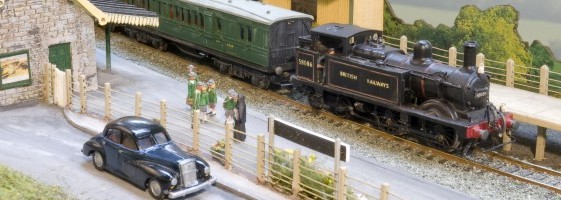











After
months of waiting for a decision on whether to electrify
the Cross City rail line from Redditch to Lichfield it
was made on 7th February 1990 by the then Transport
Minister Cecil Parkinson coincidentally during the
campaign for a by-election in the Lichfield
constituency. With this agreement the Regional Railways
sector of British Rail needed to order new electrical
multiple units, both to replace older electric units
around Birmingham and Manchester, and to work services
on the newly electrified Birmingham Cross-City Line.
Significantly with the plan for most of the new trains
to be used in the West Midlands the members of the West
Midlands Passenger Transport Authority were very keen
the trains were built in the West Midlands.
New Trains Ordered
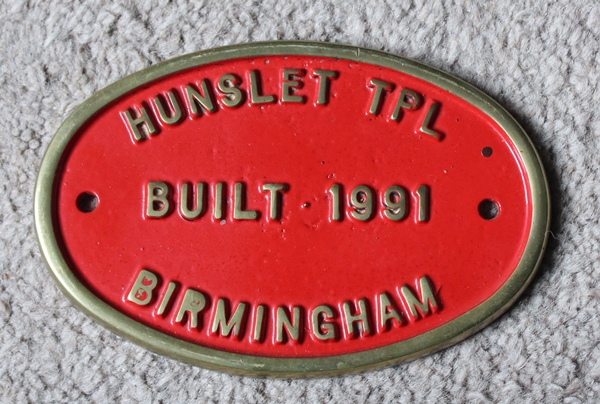 In
June 1990, the contract to build the new trains was
awarded to Hunslet Transportation Projects of
Birmingham, a new company set up by a team of engineers
and managers who had left the Birmingham based
Metro-Cammell when it closed. It won the contract in
competition with six other European train builders. The
trains were designed at offices in South Birmingham. With the company
having a Birmingham head office the new trains could
have made in Birmingham builders plates despite the
trains actually being built and fitted out at the
Hunslet works in Leeds.
In
June 1990, the contract to build the new trains was
awarded to Hunslet Transportation Projects of
Birmingham, a new company set up by a team of engineers
and managers who had left the Birmingham based
Metro-Cammell when it closed. It won the contract in
competition with six other European train builders. The
trains were designed at offices in South Birmingham. With the company
having a Birmingham head office the new trains could
have made in Birmingham builders plates despite the
trains actually being built and fitted out at the
Hunslet works in Leeds.
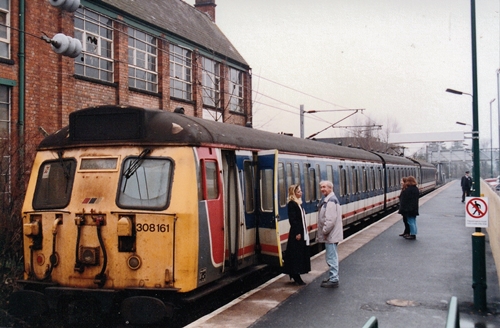 Initially 37 units were ordered,
with the option for fourteen more. Eighteen would be
needed for the Cross-City Line, while the remainder
would replace older units (such as the Class 304 and
Class 310 units). Utimately a total of 43 three-car units
were actually built. When the electrification of the
Leeds/Bradford – Skipton/Ilkley Airedale/Wharfedale
Lines was confirmed in the early 1990s, Regional
Railways and West Yorkshire PTE applied to the
government for 14 units to add to those already on
order. At the time, government spending on the railways
was restricted due to the impending privatisation of
British Rail and eventually, when funding was not
forthcoming, the follow on order was cancelled. Instead, 21
second-hand Class 308 units from Network South East were
used until new Class 333 EMUs entered service in 2001.
Initially 37 units were ordered,
with the option for fourteen more. Eighteen would be
needed for the Cross-City Line, while the remainder
would replace older units (such as the Class 304 and
Class 310 units). Utimately a total of 43 three-car units
were actually built. When the electrification of the
Leeds/Bradford – Skipton/Ilkley Airedale/Wharfedale
Lines was confirmed in the early 1990s, Regional
Railways and West Yorkshire PTE applied to the
government for 14 units to add to those already on
order. At the time, government spending on the railways
was restricted due to the impending privatisation of
British Rail and eventually, when funding was not
forthcoming, the follow on order was cancelled. Instead, 21
second-hand Class 308 units from Network South East were
used until new Class 333 EMUs entered service in 2001.
Problems with the trains when they were delivered
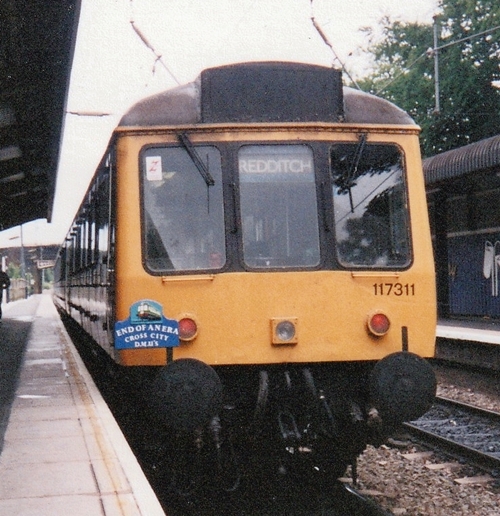 Significantly some of these Class
308 unites would see use in the West Midlands when there
were mechanical issues with the Class 323 units going
into service. Units 323201–323222 and 323240–323243
entered service in the West Midlands and 323223-323239
entering service in the Manchester area. The final four
West Midlands units were known as the growth units and
were paid for directly by Centro and they had plaques in
the entrance vestibules to that effect. When the
ownership of the units was transferred to Porterbrook at
privatisation the four units were sold to them. The
Class 323s were initially beset with a number of
technical problems related to their traction motors,
doors, traction converters, gearbox and vibration at
high speed which took several years to resolve,
preventing them from entering service. The first unit
finally entered revenue-earning service on 7 February
1994.
Significantly some of these Class
308 unites would see use in the West Midlands when there
were mechanical issues with the Class 323 units going
into service. Units 323201–323222 and 323240–323243
entered service in the West Midlands and 323223-323239
entering service in the Manchester area. The final four
West Midlands units were known as the growth units and
were paid for directly by Centro and they had plaques in
the entrance vestibules to that effect. When the
ownership of the units was transferred to Porterbrook at
privatisation the four units were sold to them. The
Class 323s were initially beset with a number of
technical problems related to their traction motors,
doors, traction converters, gearbox and vibration at
high speed which took several years to resolve,
preventing them from entering service. The first unit
finally entered revenue-earning service on 7 February
1994.
 A
mixed fleet of elderly diesels which the 323s had been
intended to replace as well as some elderly Class 304,
Class 308 and Class 310 electric units were drafted in
to operate Cross-City Line services until the problems
were resolved. Electric services began on 26 November
1992 on the northern section of the Cross-City Line,
before the entire route was energised in June the
following year. The 323s became reliable enough to
operate a full service to Longbridge and Redditch in
1995.
A
mixed fleet of elderly diesels which the 323s had been
intended to replace as well as some elderly Class 304,
Class 308 and Class 310 electric units were drafted in
to operate Cross-City Line services until the problems
were resolved. Electric services began on 26 November
1992 on the northern section of the Cross-City Line,
before the entire route was energised in June the
following year. The 323s became reliable enough to
operate a full service to Longbridge and Redditch in
1995.
The Railways are privatised
The West Midlands Class 323 units were operated by the Central division of Regional Railways and with the privatisation of British Rail it passed into the private sector as Central Trains on 2 March 1997. The franchise was awarded to National Express, who maintained control of the company until its eventual demise in 2007. In terms of Class 323 operation, it was very much carrying on as before with the trains remaining in their Centro Regional Railways livery. The trains did on occasions stray out of the West Midlands with it not unheard for them to be used on the Birmingham to Liverpool services.
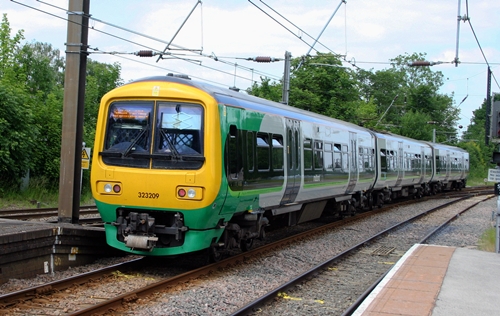 The
Central Trains operation came to an end on 11th
November 2007 when a new operator London Midland owned
by Govia took over the running of local rail services in
the West Midlands and the fleet of Class 323 units.
London Midland had a franchise commitment of running all
6 car trains on the Cross City line. This was to be
achieved by transferring the Manchester based units to
the West Midlands. This never happened and 6 car trains
on all Cross City services was not achieved. During the
franchise all of the Class 323 units were given a much
needed external repaint (using vinyls and not actual
paint).
The
Central Trains operation came to an end on 11th
November 2007 when a new operator London Midland owned
by Govia took over the running of local rail services in
the West Midlands and the fleet of Class 323 units.
London Midland had a franchise commitment of running all
6 car trains on the Cross City line. This was to be
achieved by transferring the Manchester based units to
the West Midlands. This never happened and 6 car trains
on all Cross City services was not achieved. During the
franchise all of the Class 323 units were given a much
needed external repaint (using vinyls and not actual
paint).
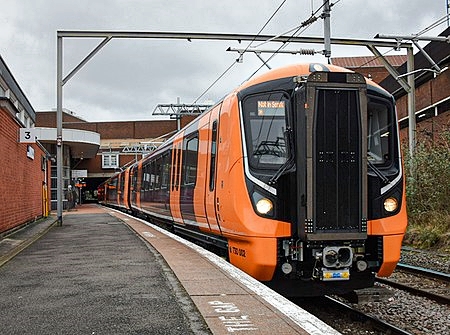 The
current franchise that since December 2022 has been a
direct award is with West Midlands Trains that started
on 10th December 2017 and is due to run until at least
26th September 2026. The operator was a joint venture
between Abellio, JR East, and Mitsui
& Co. In August 2022, Abellio agreed terms to sell
it UK operations to the Transport UK Group, a management
buyout led by managing director Dominic Booth. The deal
was completed in February 2023. This franchise looks to
replacing all of the Class 323 units in the West
Midlands by new Class 730 which are due for introduction
during 2024. With the general reduction of train
frequencies during Covid the frequency of a 20 minute
frequency to Redditch and to Bromsgrove and a core
frequency of every 10 minutes between Longbridge and
Four Oaks was reduced to every 30 minutes on the
Redditch and Bromsgrove legs and every 15 minutes on the
core service. This has finally meant there is enough
Class 323 units to run all the trains as 6 car
formations. The first Class 730 went into service
on Monday 15th April 2024.
The
current franchise that since December 2022 has been a
direct award is with West Midlands Trains that started
on 10th December 2017 and is due to run until at least
26th September 2026. The operator was a joint venture
between Abellio, JR East, and Mitsui
& Co. In August 2022, Abellio agreed terms to sell
it UK operations to the Transport UK Group, a management
buyout led by managing director Dominic Booth. The deal
was completed in February 2023. This franchise looks to
replacing all of the Class 323 units in the West
Midlands by new Class 730 which are due for introduction
during 2024. With the general reduction of train
frequencies during Covid the frequency of a 20 minute
frequency to Redditch and to Bromsgrove and a core
frequency of every 10 minutes between Longbridge and
Four Oaks was reduced to every 30 minutes on the
Redditch and Bromsgrove legs and every 15 minutes on the
core service. This has finally meant there is enough
Class 323 units to run all the trains as 6 car
formations. The first Class 730 went into service
on Monday 15th April 2024.
The Train Specification
The trains operate in the following formations:
| Class | Operator | Quanity | Built | Cars Per Unit | Set Numbers |
| 323 | West Midlands Trains | 21 | 1992-1995 | 3 | 323201-22 |
| 323 | Northern Trains | 17 | 3 | 323223-39 | |
| 323 | West Midlands Trains | 4 | 3 | 323240-43 |
The coaches take the following running numbers the outer coaches which are Driving Motor Seconds (DMS) have the running numbers 64001–64043 and 65001–65043. The centre cars which are Trailer Seconds (TS) take the numbers 72201–72239 then 72340–72343
Train Refurbished
Between 2018 and 2022 all of the class 323 units operated by both Northern Trains and West Midlands Trains received a full refurbishment. The first unit refurbished units were delivered to West Midlands Trains in February 2019 and the first Arriva Rail North on 22nd October 2019. These works involved the replacement of seat covers, interior and exterior repainting (into the new livery of their respective operators), the installation of a new passenger information system and wheelchair call-for-aid buttons, and the addition of an accessible toilet in place of the original small toilet cubicles The last Class 323 unit to be refurbished (323224) returned to Northern Trains on 23 January 2021, while the last West Midlands Trains 323 unit (323226) was returned in 2020.
Train Names
In the last years operation with West Midlands Trains many of the units now carry names of stations that are served by the Cross City line. Significantly 323221 was named Northfield but this was removed when it was repainted into Centro livery and 323241 carries a name to mark service of a significant fleet engineer in keeping the units operating in the West Midlands. 323217/8 have not been named and significantly no unit is named Lichfield City.
| Unit Number | Name | Unit Number | Name | Unit Number | Name |
| 323201 | Duddeston | 323209 | Birmingham New Street | 323219 | Kings Norton |
| 323202 | Butler Lane | 323210 | Shenstone | 323220 | Lichfield Trent Valley |
| 323203 | Aston | 323211 | Four Oaks | 323221 | Northfield |
| 323204 | Selly Oak | 323212 | Bromsgrove | 323222 | Redditch |
| 323205 | Blake Street | 323213 | Sutton Coldfield | 323240 | Erdington |
| 323206 | Barnt Green | 323214 | Wylde Green | 323241 | Dave Pomroy 323 Fleet Engineer 40 Years Service |
| 323207 | Bournville | 323215 | Gravellly Hill | 323242 | Alvechurch |
| 323208 | Five Ways | 323216 | University | 323243 | Longbridge |
Back dating a Unit
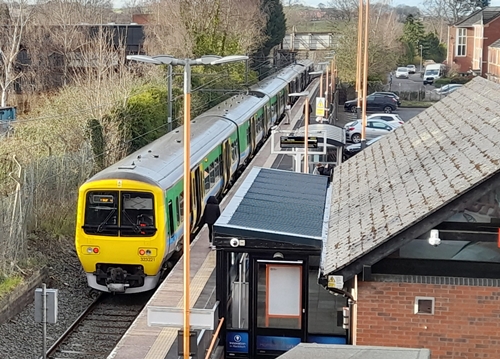 On December 19th, 2022, 323221 re-entered service with
West Midlands Trains after it had been returned to the
variation of the Regional Railways Centro green, blue
and grey livery, as carried by the fleet when first
delivered to BR in the West Midlands 30 years ago.
323221 emerged from Soho depot in Centro livery,
although the design is slightly different to the
original to comply with modern regulations. West Midland
Trains is the latest operator to return a train into a
modern variation of a now defunct colour scheme within
the fleet. The main differences from the original
version are that the doors are now finished in yellow
(originally the doors matched the body sides, but the
upper sections of the doors were later painted yellow),
the grey band at the top of the bodywork is slightly
narrower than on the original, and the lighting clusters
on the cab fronts are yellow rather than black.
On December 19th, 2022, 323221 re-entered service with
West Midlands Trains after it had been returned to the
variation of the Regional Railways Centro green, blue
and grey livery, as carried by the fleet when first
delivered to BR in the West Midlands 30 years ago.
323221 emerged from Soho depot in Centro livery,
although the design is slightly different to the
original to comply with modern regulations. West Midland
Trains is the latest operator to return a train into a
modern variation of a now defunct colour scheme within
the fleet. The main differences from the original
version are that the doors are now finished in yellow
(originally the doors matched the body sides, but the
upper sections of the doors were later painted yellow),
the grey band at the top of the bodywork is slightly
narrower than on the original, and the lighting clusters
on the cab fronts are yellow rather than black.
Redditch becomes a depot once again
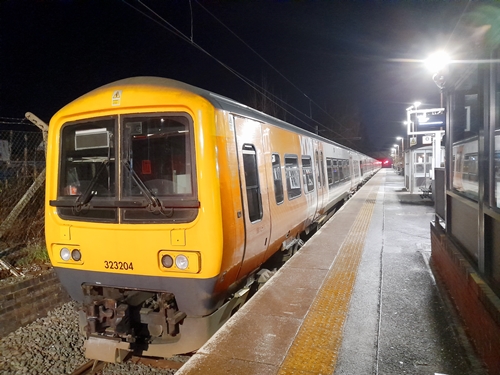 As
a throw back that has not happened at Redditch since the
1960s when the former shed at the station closed trains
were stabled at Redditch
during the rail strikes in 2022 and 2023. It became
customary for the last train on the day before a strike
to be left at Redditch station in the platform so that
when the train service restarted the day after the
strike finished West Midlands Trains was able to ensure
the first train of the day could operate. This way of
working also meant the driver and conductor for the
train had to be ferried to and from Redditch Station and
the depot in a taxi.
As
a throw back that has not happened at Redditch since the
1960s when the former shed at the station closed trains
were stabled at Redditch
during the rail strikes in 2022 and 2023. It became
customary for the last train on the day before a strike
to be left at Redditch station in the platform so that
when the train service restarted the day after the
strike finished West Midlands Trains was able to ensure
the first train of the day could operate. This way of
working also meant the driver and conductor for the
train had to be ferried to and from Redditch Station and
the depot in a taxi.
Spin off units
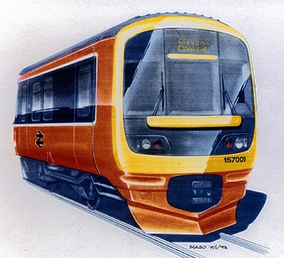 When Hunslet TPL designed the Class 323 in the early
1990s they always had an eye on more orders than just
for the Birmingham and Manchester local services. As
outlined above there were moves to purchase some for the
West Yorkshire electrification project around Bradford
which came to nothing.
The 323 actually was given clearance to theoretically
subject to availability of electric power to be used on any line in
Great Britain which certainly has not happened with
trains produced more recently. Hunslet TPL did go onto produce a
potential diesel version of the Class 323 that was
provisionally given the Class 157 designation. The plan
was 21 units of what was know as the Strathclyde
Sprinter would be built for use in the Glasgow
area. In the end Class 170 unit were purchased instead.
When Hunslet TPL designed the Class 323 in the early
1990s they always had an eye on more orders than just
for the Birmingham and Manchester local services. As
outlined above there were moves to purchase some for the
West Yorkshire electrification project around Bradford
which came to nothing.
The 323 actually was given clearance to theoretically
subject to availability of electric power to be used on any line in
Great Britain which certainly has not happened with
trains produced more recently. Hunslet TPL did go onto produce a
potential diesel version of the Class 323 that was
provisionally given the Class 157 designation. The plan
was 21 units of what was know as the Strathclyde
Sprinter would be built for use in the Glasgow
area. In the end Class 170 unit were purchased instead.
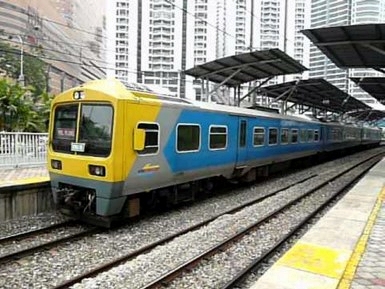 Looking for export potential from the Class 323 Hunslet
TPL landed a contract with KTM Komuter who are a commuter
rail system in Malaysia. 18 sets were ordered, designed by
Hunslet TPL and built by Ganz Works between 1993 and 1994.
KTM Komuter
designated the units as Class 81 in the fleet. The KTM Class 81
design is derived from the British Rail Class 323, with
the main alteration being that it has single leaf
swing-plug doors instead of a double leaf type. The
units entered service on 3rd August 1995 and were built
to run on metre gauge track. These 3 car sets were often
run in the peak periods in 9 car formations. Spare
parts for the units soon became a problem with many of
the units ending up being hauled by diesel locomotives.
All had been taken out of service by 2012 as new trains
came into service. However, in 2018 five of the 18 units
were refurbished and put back into service. The units
have a total seating capacity of 224 passengers.
Looking for export potential from the Class 323 Hunslet
TPL landed a contract with KTM Komuter who are a commuter
rail system in Malaysia. 18 sets were ordered, designed by
Hunslet TPL and built by Ganz Works between 1993 and 1994.
KTM Komuter
designated the units as Class 81 in the fleet. The KTM Class 81
design is derived from the British Rail Class 323, with
the main alteration being that it has single leaf
swing-plug doors instead of a double leaf type. The
units entered service on 3rd August 1995 and were built
to run on metre gauge track. These 3 car sets were often
run in the peak periods in 9 car formations. Spare
parts for the units soon became a problem with many of
the units ending up being hauled by diesel locomotives.
All had been taken out of service by 2012 as new trains
came into service. However, in 2018 five of the 18 units
were refurbished and put back into service. The units
have a total seating capacity of 224 passengers.